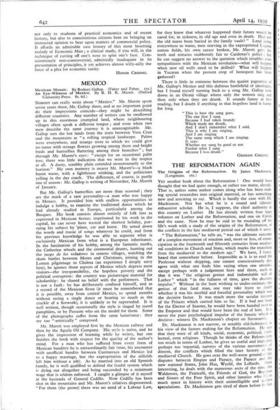MEXICO
NOBODY can really write about " Mexico." Mr. Marett spent seven years there, Mr. Gallop three, and at no important point do their impressions coincide—they might be describing different countries. Any number of writers can be swallowed up in this enormous crumpled land, where neighbouring villages often speak a different tongue ; and even when two men describe the same journey it is unrecognisable. Mr. Gallop sees the hot lands from the train between Vera Cruz and the mountains as " a rolling tropical landscape. Palms were everywhere, and strange trees to which we could give no name with strange flowers growing among them and bright birds and butterflies fluttering among their branches " ; but through Mr. Marett's eyes : " except for an occasional palm tree, there was little indication that we were in the tropics at all. A dusty, scrubby plain extended monotonously to the horizon." My own memory is nearer Mr. Marett's—a black burnt waste, with a lighthouse winking, and the politicians yelling in the day coach. The difference, of course, is partly one of season: Mr. Gallop is writing of November, Mr. Marett of January.
But Mr. Gallop's butterflies are more than seasonal ; they are the mark of a rare personality—a man who was happy in Mexico. It provided him with endless opportunities to indulge a hobby, to examine the traditional dance which he had already studied in Europe, particularly among the Basques. His book consists almost entirely of folk lore as expressed in Mexican fiestas; imprisoned by his work in the capital, he can never have wasted the shortest holiday, pur- suing his subject by 'plane, car and horse. He noted down the words and music of songs wherever he could, and from his previous knowledge he was able to separate what is exclusively Mexican from what is a European inheritance. In the fascination of his hobby, among the fantastic masks, the Catherine wheels and the ceremonial drums, hunting out the juego de los voladores in remote villages, watching the sham battles between Moors and Christians, joining in the Lenten pilgrimage to Chalma (an experience I deeply envy him), he ignores those aspects of Mexico which depress most visitors—the irresponsibility, the hopeless poverty and the political corruption : the country was picturesque material for scholarship : he shared no belief with the performers. That is not a fault : he has deliberately confined himself, and as a record of the Mexican fiesta (it must be remembered that it is possible, away from central Mexico, to spend months without seeing a single dance or hearing so much as the crackle of a firework), it is unlikely to be superseded. It is well written, though occasionally the style is tinged by travel pamphlets, or by Prescott who set the model for them. Some of the photographs suffer from the same luxuriance : they are too " artistically " composed.
Mr. Marett was employed first by the Mexican railway and then by the Aguila Oil Company. His style is naïve, and he gives the impression of learning while he writes, but one finishes the book with respect for the quality of the author's mind. For a man who has suffered from every form of Mexican banditry he is extraordinarily fair (true, his encounter with unofficial bandits between Cuernavaca and Mexico led to a happy marriage, but the expropriation of the oilfields left him without a job). As he married into an old Spanish family, he is well qualified to defend the feudal system which is dying out altogether and being succeeded by a minimum wage that is seldom enforced. I caught a glimpse of it myself at the hacienda of General Cedillo. Now Cedillo has been shot in the mountains and Mr. Marett's relatives dispossessed. " For them (the peons) there was no need of a Labour Law, for they knew that whatever happened their future would be cared for, in sickness, in old age and even in death. Had not
the old nurse been buried in the family vault? " Land going everywhere to waste, men starving in the expropriated Laguna cotton fields, his own career broken, Mr. Marett grits his teeth and remains stubbornly fair to Cardenas's policy ; but he can suggest no answer to the question which troubles even sympathisers with the Mexican revolution—what will happen when new oil wells need to be drilled? What will happen in Yucatan when the present crop of henequen has been gathered?
There is little in common between the quaint pageantry of Mr. Gallop's Mexico and this dubious battlefield of ideologies, but I found myself turning back to a song Mr. Gallop took down in an Otomi village where only the women sing and
then only when they are drunk. It sounds funny at first reading, but I doubt if anything in that hopeless land is funny for long.
" This is how the song goes, The one that I sang Because I had taken brandy Which made me drunk, And I don't remember what I said, This is why I am singing, And I am singing The same song which I am singing. It says: Whether my song be good or not Pardon what I sang Because I was drunk." GRAHAM GREENE.






































 Previous page
Previous page